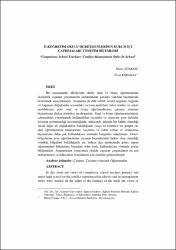İlköğretim Okulu Öğretmenlerinin Kurum İçi Çatışmaları Yönetim Biçemleri
Abstract
Bu araştırmada, ilköğretim okulu sınıf ve branş öğretmenlerin
okullarda yaşanan çatışmalarda kullandıkları çatışma yönetim biçemlerini
belirlemek amaçlanmıştır. Araştırma da elde edilen veriler ışığında; bağımlı
ve bağımsız değişkenler arasındaki varyans analizleri, tukey testleri ve anket
maddelerine göre sınıf ve branş öğretmenlerinin çatışma yönetim
biçemlerine ilişkin görüşleri incelenmiştir. Sınıf ve branş öğretmenlerimizin
çatışmaların yönetiminde kullandıkları biçemler ve cinsiyete göre farklılık
gösterip göstermediği incelendiğinde, aralarında anlamlı bir farkın olmadığı
ancak diğer alt değişkenlere bakıldığında yaşça ve kıdemce üst grupta yer
alan öğretmenlerin tümleştirme, kaçınma ve ödün verme ve uzlaştırma
biçemlerini daha çok kullandıkları yönünde bulgulara ulaşılmıştır. Görev
bölgelerine göre öğretmenlerin çatışma biçemlerinde farkın olup olmadığı
yöndeki bulgulara bakıldığında ise, sadece ilçe merkezinde görev yapan
öğretmenleri hükmetme biçemini daha fazla kullandıkları yönünde görüş
bildirmişler. Araştırmanın sonucunda okulda yaşanan çatışmaların en aza
indirgenmesi ve daha etkin yönetilmesi için öneriler geliştirilmiştir. In this study the views of compulsory school teachers primary and
junior high school on the conflict experienced in schools and its management
styles were studied. In the lights of the findings of the study the views of compulsory school teachers on conflict management styles were discussed
via t-test for equality of means, f-test and Tukey tests. As a result of the
study, when we looked the findings related with what styles teacher used and
the gender in the management of conflict, there was no difference
statistically significant. However as for age and seniority older teachers and
the teachers with more seniority scored higher in integrating, obliging,
avoiding and compromising styles than younger ones and the teachers with
less seniority. When we looked at the findings related with teachers conflict
management styles according to where they worked, only the ones working
in not in the city center but in the country scored higher in the style of
authority than the ones working in city center. As a result of these findings,
suggestions were put forward how to diminish conflicts experienced in
school setting and to manage conflict effectively.
Source
Sosyal Bilimler DergisiVolume
8Issue
1Collections
- Cilt 8 : Sayı 1 [15]



















